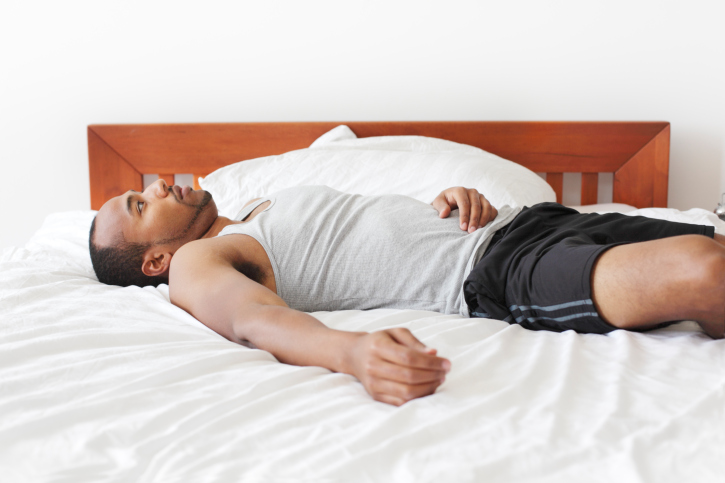
Sleepwalking can be downright frightening. From the viewpoint of the witness to the sleepwalking, there is simply a person sleeping while walking! From the viewpoint of the sleepwalker, you are unaware of your movement (since you are supposed to be sleeping in bed), so waking up can be a startling experience, sometimes fatal. A friend once told me a story about his younger brother, a sleepwalker. They had the misfortune of living by a lake. One night, the little boy slept-walk out of the house and unknowingly headed for the lake. Of course as things would turn out, the boy did not actually awaken until he hit the water.
Imagine the last thing you remember was falling asleep before you suddenly wake up in a cold-water lake. Naturally, the boy screamed in terror, having a panic attack as his family made its way outside, seeing the boy lying on the shore, terrified. It took him a short time to come to his senses and calm down, realizing what happened. But do not underestimate the danger for the sleepwalker. The sudden wake-up can cause a heart attack. Terrifyingly, there have also been cases where sleepwalkers have been killed after walking into a busy road or have injured a family member.
According to Healthline, “Sleepwalking most commonly occurs in children ages 4 to 8. It is most likely to take place during deep non-rapid eye movement (NREM) sleep and early in the night—about one to two hours after going to sleep.” Symptoms of sleepwalking include: sitting up in bed while opening and closing your eyes, having a glazed-over or glassy expression in your eyes, walking around your home performing everyday activities, such as turning the lights on or off, speaking or moving in a way that does not make sense. So what are the causes?
Causes
Sleepwalking can be a sign of an underlying medical condition, such as restless leg syndrome, obstructive sleep apnea or migraine headaches. Your doctor may wish to test you for these treatable conditions. Oftentimes, sleepwalking can also have a genetic link. If your parents have a history of sleepwalking, chances are you may sleepwalk as well.
In rare cases, certain medications can cause sleepwalking. These include the sleep medication zolpidem, known by the brand names Ambien and Edluar. A research team from Washington University tested a group of people who suffered from sleepwalking. They determined that all the sufferers had a fault on a particular chromosome and carrying just one copy of this defective DNA was enough to cause sleepwalking. According to Daily Mail, 1 in 10 children while it affects 1 in 50 adults.
It is important to note that a person prone to sleepwalking has triggers that can activate it. Although plenty of research is still being done on this phenonmenon, some of the known triggers are stress and fatigue.
What To Do?
There is no specific treatment for sleepwalking, according to the National Sleep Foundation. While sleepwalking is not always a cause of concern since many kids outgrow it, if it has led to injuries or is happening too often for comfort, then you may want to get the disorder evaluated by a physician.
Typically, people are not prescribed medication for sleepwalking, but some examples of medication that have been prescribed are benzodiazepines or antidepressants. Benzodiazepines are typically used to treat anxiety but also work for sleep disorders. Antidepressants typically treat depression but have been known to help treat sleepwalking, specifically. Furthermore, the intake of these medications help reduce stress and anxiety altogether, two triggers of sleepwalking. Again, these may be prescribed with extreme cases only. Some people even turn to hypnosis to treat the condition!Lifestyle changes can also help prevent further episodes. The National Sleep Foundation cites several ways to cope with and decrease the likelihood of a sleepwalking episode. Lifestyle changes, such as minimizing stress, anxiety, or conflict may help. Also, developing better sleep habits like doing something that relaxes you before going to sleep, such as reading a book, listening to music, or taking a warm bath, may help to reduce your chances of a sleepwalking episode.
Sleep deprivation can also lead to sleepwalking, so following a set sleep schedule is helpful. Obviously, avoid caffeine but also avoid alcohol before bed; alcohol is also known to trigger sleepwalking because of its effects on the central nervous system.
Also note that all sleepwalker’s dwellings should be hazard-proof. It is enough danger that a sleepwalker can simply fall and hit the ground (maybe down a flight of stairs!). The last thing that a sleepwalker needs is sharp objects poking out in their “stomping ground”. As we learned from my friend’s story in the beginning, it is beneficial to lock the doors and windows. Moving electrical cords against the wall, and putting a gate in front of the stairs (if you sleep above the first floor) are not bad ideas either.
Contrary to popular belief, according to the National Sleep Foundation, you can and should awaken a sleepwalker while he or she is sleepwalking, but do so gently so as not to startle him or her. “However, a sleepwalking person is typically difficult to wake and will at first be confused as to where he or she is. Gently lead the individual back to his or her bed.”
For more articles, click here.








